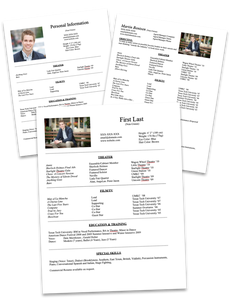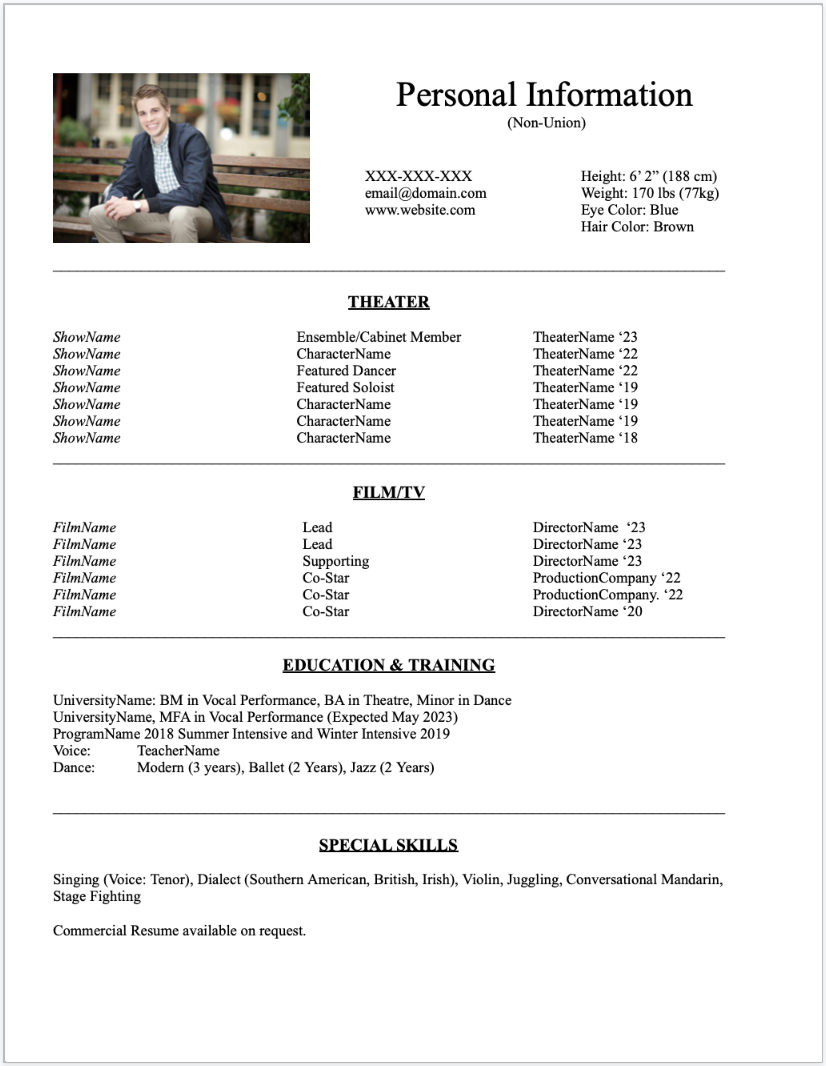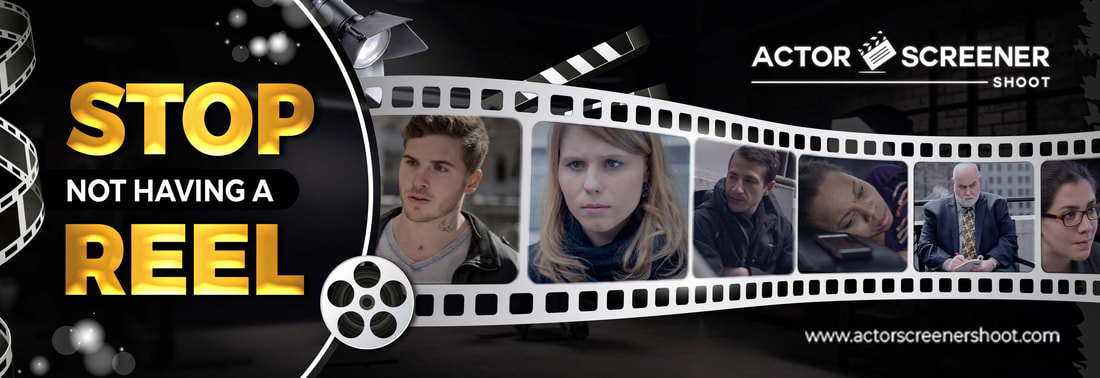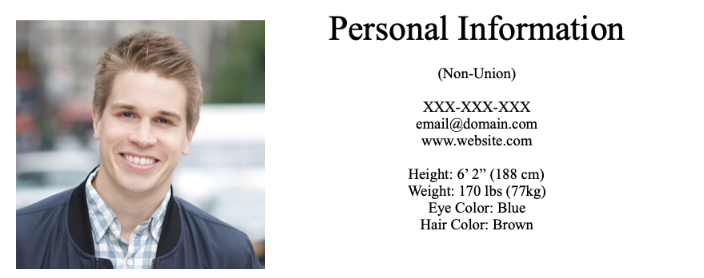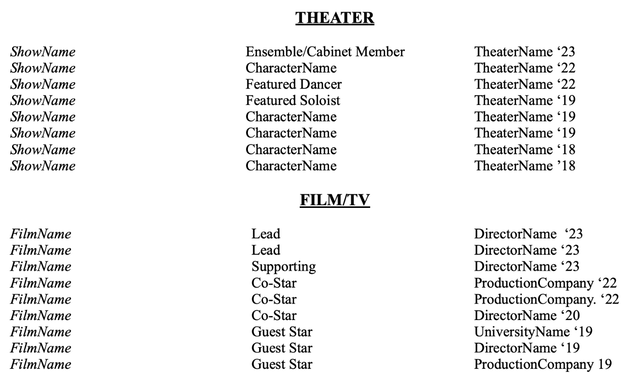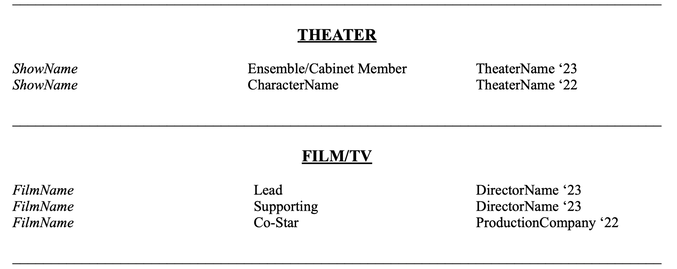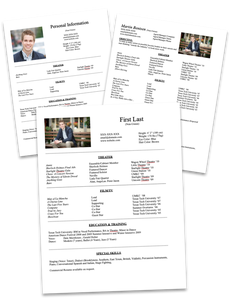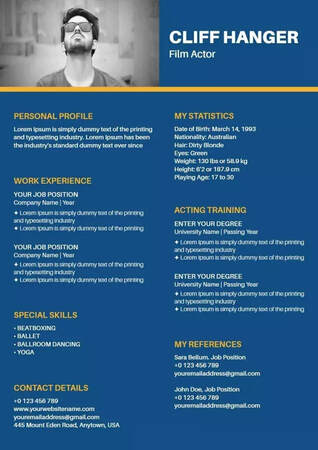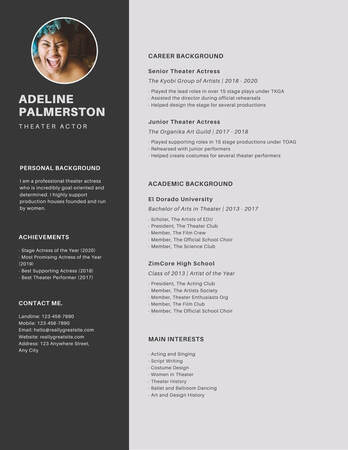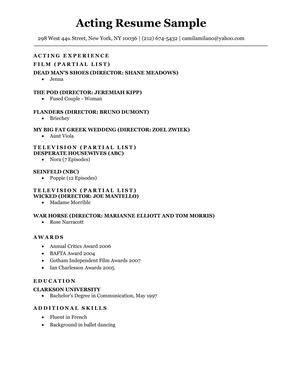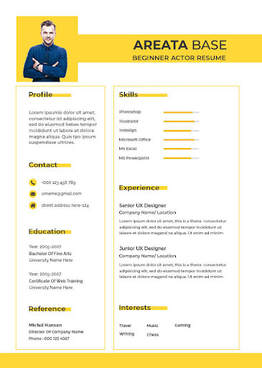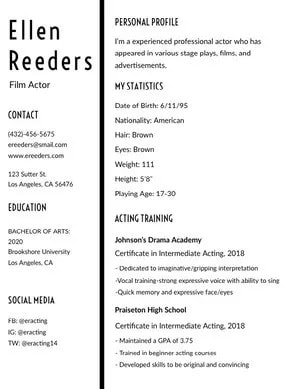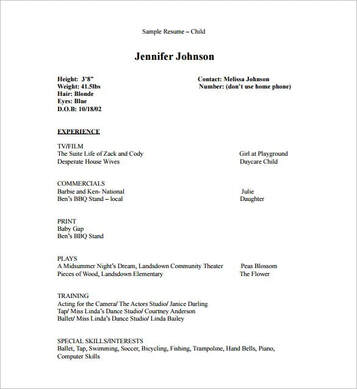Here's how to make a theater resume, step by step.
|
|
Theater Resume: The Ultimate Guide
What is a Theater Resume?
A theater resume is a simple reference sheet so casting directors can get a sense of your experience. It tells them about your most noteworthy roles, plus your training, special skills, and contact info.
What Should be on a Theatre Resume?
|
A theatre resume is broken up into four sections, which we'll be covering in depth in this article:
See the sample theater resume so you have an idea of what each section looks like: |
How to Structure Your Theater Resume
Don't worry if you have little or no experience yet. You won't need professional credits to design a theater resume, and there are tons of ways to book acting work without professional credits.
In this section, we'll go through each segment of your theatre resume, starting from the top (Personal Information) and moving all the way to the bottom (Special Skills).
Before you start, I recommend you download my free Google Docs resume templates so everything is in perfect alignment and formatted correctly. Then, follow along!
In this section, we'll go through each segment of your theatre resume, starting from the top (Personal Information) and moving all the way to the bottom (Special Skills).
Before you start, I recommend you download my free Google Docs resume templates so everything is in perfect alignment and formatted correctly. Then, follow along!
Section 1: Personal Information
This is where you'll list the basics, such as your contact info and descriptive information about yourself. Use the following checklist and include everything you can (it's OK if you don't have everything listed below):
Having trouble with formatting/alignment? Download our free theater resume templates here.
- Your name, phone number, email address (don't include your home address), and website. Note that having a website is not mandatory but can definitely make you appear more established.
- If you have an agent or manager, list their contact information. Some may prefer you to hide your own contact information and only list theirs, but you can speak with them about it.
- Include your height, weight, hair and eye color. If you're in the US, be sure to use inches and feet, and if you're outside the United States use the metric system. Do not include your age unless you are under 18.
- Include a headshot if you need to fill up space. Although it's true that you'll have your headshot stapled to the back of your resume, you can also include a different one printed on the front as a way to fill up some of the white space (especially if you don't have many credits yet). Make sure you use a professional headshot if you want to be taken seriously.
- Include vocal type or range if you sing. An example would be Tenor, or Low E-Flat to High D.
- Include union affiliations. If you're just starting out, chances are you're not a part of a union yet, so you should write "Non-Union." Otherwise you can write Equity/AEA, etc.
Having trouble with formatting/alignment? Download our free theater resume templates here.
Section 2: Credits
If you've been in the industry for a while, the Credits section is where the bulk of your content will be. If you're just starting out, this part might be tiny and more content will be in the Training/Education section.
- What to Include: If you're older than 25, don't include credits from productions you did when you were younger than 18. If you're younger than 25, you can add roles you've played within the past 5-10 years, but don't go further back than that. It's completely fine to include roles from classes and workshops.
- Alignment: Have the name of the production in the left-most column, the name of your role in the middle column, and the name of the director or theater company (whichever is more well-known) in the right column.
- Categories: For a theater resume, you'll see credits listed under just one category: Theater. But if you do both screen and stage acting, you can break it into two categories: Film/TV and Theater.
- Character Names: For Theater, include character names and then in parentheses next to it, add "cast," "ensemble," etc. If you have any Film/TV credits, it's best to avoid character names completely and just use the role descriptions ("lead," "supporting," etc.).
- Famous People: If you had the opportunity to work with a famous actor in a scene, add their name in parentheses next to the role. An example would be (w/ Lindsay Lohan).
- Lead With Your Most Impressive Stuff: Put your biggest credits first and do not include dates of productions on your resume. Related: Types of Acting Roles (Lead, Recurring, etc.) – Learn What They Are and How to Get Them
Having trouble with formatting/alignment? Download our free theatre resume templates here.
Section 3: Training & Education
In this section, you'll list out formal training (if related to acting), acting workshops, seminars, studio classes, master classes, or private coaching. This also includes special training not directly related to acting, such as singing or stunt-work.
What Casting Directors are Looking For:
- Names of program directors, teachers, or educators they recognize (try typing your instructors' names into Google– if their name shows up in lots of articles, chances are casting directors will recognize them).
- Names of schools or workshops they recognize (you can use the same strategy as above to see how well-known the workshop/school is).
- Length of time you studied a particular skillset, and how recently you studied it.
- Type of training you've had.
There's no specific right or wrong format to list out your training, but just make it easy for a casting director to see what you've done – especially if you don't have many credits.
Using a two-column format like below can make it easy for them to read. Including dates is optional but recommended if you completed the training within the past 2-3 years.
If you need to fill up a lot of space, feel free to list bullet points under each training, showing specifically what knowledge was gained. Example:
2011-2015, BFA in Acting
University of Southern California, Los Angeles
- Pursued my passion for acting and singing
- Won “Best Actor" Award in USC's Theatrical Showcase
- Starred as lead in three college theatre productions
Having trouble with formatting/alignment? Download our free actor resume templates here.
Section 4: Special Skills
Did you know that it's possible to get booked because of your Special Skills alone?
It's true, especially on websites like Actor's Access. Most casting directors for major productions use Actor's Access to find actors who have specific special skills. Here's how it works:
Can you see why your special skills are so important? Sometimes they're the specific reason you'll get hired for a job and oftentimes they'll be your ticket to get network-level Film & TV roles if you don't have an agent.
Special skills are typically considered specific talents you have a high level of proficiency in, but sometimes they can simply be conversation starters – interesting anecdotes that might get an agent or casting director interested in meeting you.
It's true, especially on websites like Actor's Access. Most casting directors for major productions use Actor's Access to find actors who have specific special skills. Here's how it works:
- A casting director posts a role on Breakdown Services, Ltd. that requires an actor who can play piano.
- Agents submit all their actors who can play piano.
- The casting director receives WAY fewer submissions than they get for standard roles, meaning they don't have many people to choose from.
- The casting director then visits Actor's Access and posts the role there, in search of more actors who can play piano so they have more people to choose from.
Can you see why your special skills are so important? Sometimes they're the specific reason you'll get hired for a job and oftentimes they'll be your ticket to get network-level Film & TV roles if you don't have an agent.
Special skills are typically considered specific talents you have a high level of proficiency in, but sometimes they can simply be conversation starters – interesting anecdotes that might get an agent or casting director interested in meeting you.
"So what skills should I put on my acting resume?" Here are some examples:
- Special Abilities (singing, cry on cue, etc.)
- Dancing Ability (hip hop dance, ballet, etc.)
- Combat Training (weapons handling, marital arts training, etc.)
- Accents (Southern dialect, Irish accent, etc.)
- Fitness Level (7% body fat, 6 pack abs, etc.)
- Fluency in Other Languages (Spanish, Mandarin, etc.)
- Musical Instruments (guitar, violin, piano, etc.)
- Driver's License (yes, this can be listed since many people don't have one)
- Acrobatic Abilities (flipping, juggling, etc.)
- Sports/Games (skiing, fencing, golf, chess etc.)
If you want to go deep on this and see TONS of examples of special skills, check out our: Acting Resume Special Skills Guide
Put whatever you think is most noteworthy first so casting directors notice it. And don't say you can do something if you're not actually proficient at it!
3 FREE Google Docs Resume Templates
Save Yourself the Frustration of Alignment & Formatting!
Most actor resume templates require special software or are very complicated to use and edit. For that reason, we've put together 3 super simple Google Docs templates ANYONE can use (no matter what type of computer you have).
Here's what you get:
Here's what you get:
|
Important Mistakes to Avoid in Your Theater Resume
- Your resume MUST be saved as a PDF format. Do not send Microsoft Word formats because the size and style changes on different computers, and what might have been one page with perfect alignment on your computer will suddenly look all messed up (and sometimes even two pages) on someone else's computer. PDF format always keeps the alignment perfect no matter where you send your resume.
- It must be easy to read. Make sure to use professional fonts like Times New Roman, Helvetica, Garamond, or Arial.
- Each heading should stand out. The different sections of your resume, such as Credits, Training & Education, etc., should be bigger and/or a different style than the rest so they stand out.
- Only use black and white. Avoid using different colors because some casting directors print resumes on black & white printers, and your section headings won't stand out. They also assume you're inexperienced and new if you use colored fonts on your resume.
- When printed, it must ONLY be one page and cut to fit on the back of your 8" X 10" headshot. You’ll align your resume so it fits perfectly on the back of your headshot, and then staple it at all four corners (don't use tape or paperclips). Then you can cut off the extra paper with scissors. Don't print your resume directly on the back of your headshots because it's going to change every time you book a new role. Watch the video below to learn how to attach your headshot to your resume:
Theater Resume Styles to AVOID
Do not make the mistake of using these templates you'll find on major resume writing websites. Unfortunately most resume sites don't have experience in creating actor resumes, so the formatting is WAY off and looks unprofessional to casting directors.
|
Why it's bad: The background should be white. Do NOT use a color for the background or you'll look like a brand new actor who just downloaded a fun template from some random resume site.
|
Why it's bad: OK, we already know the background should have been white. But the vertical formatting of the resume is not at all industry-standard. Every section should be going down the page horizontally.
|
|
Why it's bad: Well, at least we've got a white background and the formatting is horizontal, so it's not THAT bad... But the problem here is that there are WAY too many categories! It makes it really hard to read and separate things. Plus, the alignment of each production is tabulated the same as the major categories, which makes it harder to skim.
|
Why it's bad: OK, so the categories are easier to see, but there should not be any random yellow highlighted parts! The bright yellow is unprofessional and distracting, and gives off the impression that it was a free template downloaded from an online site, which screams "new actor." If you really want to use bits of coloring on your resume, stick to neutral, cool tones like dark blue or green. But generally I still advise to stay away from color!
|
|
Why it's bad: OK, so this resume is actually not too bad. It's easy to read and get a sense of the actor's training, etc., but again, the formatting is incorrect. It should be aligned horizontally and not separated into two columns. Stay away from two columns – casting directors will never take those resumes seriously!
|
Why it's bad: This resume is much closer to industry standard, BUT... there is WAY too much white space. It looks like a brand new actor who's just getting started. It's much better to use a template that fills in more space.
|
3 Secret Actor Resume Hacks
Think "Outside the Industry"
As Einstein says, "Insanity is doing the same thing over and over and expecting different results."
I'm all about thinking differently, and I teach actors how to break the rules and do things most other actors don't consider.
In fact, one of my clients landed his first-ever Broadway role in just 4 weeks of implementing some of my "outside the industry" strategies.
So now that you understand the basics of a professional acting resume, I'd like to present you with three "outside the industry" hacks you can use to make your resume even MORE effective:
I'm all about thinking differently, and I teach actors how to break the rules and do things most other actors don't consider.
In fact, one of my clients landed his first-ever Broadway role in just 4 weeks of implementing some of my "outside the industry" strategies.
So now that you understand the basics of a professional acting resume, I'd like to present you with three "outside the industry" hacks you can use to make your resume even MORE effective:
"Outside the Industry" Hack #1:
Awards and Quotes
A unique way to stand out from other actors (and use up some dreaded "white space") is to include noteworthy reviews or quotes from people you've worked with in the industry. You can list 2-3 simple one-sentence reviews at the very bottom of your resume (center-aligned), such as "John Doe was one of the most consistently on-time and professional actors I've ever had the pleasure of working with. – Jane Smith (Director, Little Shop of Horrors)"
Don't have any quotes? Just email some past teachers or friends you've worked with and ask them to write 1-2 sentences. Obviously, the bigger their names the better, but even if they're unknown people, you can still include their quotes on your resume just to provide some "social proof" so to speak and to fill in that white space!
You should also include any awards you've won in parentheses next to the role you played. Keep in mind that these awards should actually be noteworthy and professional – don't mention the high school "Funniest Actor" award you won for the little play you made with your friends.
Don't have any quotes? Just email some past teachers or friends you've worked with and ask them to write 1-2 sentences. Obviously, the bigger their names the better, but even if they're unknown people, you can still include their quotes on your resume just to provide some "social proof" so to speak and to fill in that white space!
You should also include any awards you've won in parentheses next to the role you played. Keep in mind that these awards should actually be noteworthy and professional – don't mention the high school "Funniest Actor" award you won for the little play you made with your friends.
"Outside the Industry" Strategy #2:
Resume Objective
A resume objective tells casting directors what your goals are... or if you do it right, why they should hire YOU over other actors for this specific production.
Here's an example of a weak resume objective: To become a successful, world-renowned actor who is reputed for her craft and compelling performances on stage.
This is OK, but is focused on YOU, instead of the production. Casting directors don't care about you, they only care about what you can do to help them.
Instead, do a bit of googling on the production and then tailor your objective to the type of project you're submitting to. If you're submitting to Little Shop of Horrors, for instance, chances are the production wants an actor who can make the audience laugh. So you can customize your resume objective like so:
Strong objective for a comedy theatrical submission: To bring smiles and laughter to the faces of as many people in the world as possible through my acting.
Do you think the casting director will notice? You bet they will!
If you're submitting to a dramatic show, think about the purpose of it... is it trying to share an important message with the world? Is it trying to make a political statement? Make an educated guess about the purpose of the project and then tailor your resume objective to that.
Since it's right at the top of your resume, the casting directors will notice and be more likely to bring you in for an audition!
Here's an example of a weak resume objective: To become a successful, world-renowned actor who is reputed for her craft and compelling performances on stage.
This is OK, but is focused on YOU, instead of the production. Casting directors don't care about you, they only care about what you can do to help them.
Instead, do a bit of googling on the production and then tailor your objective to the type of project you're submitting to. If you're submitting to Little Shop of Horrors, for instance, chances are the production wants an actor who can make the audience laugh. So you can customize your resume objective like so:
Strong objective for a comedy theatrical submission: To bring smiles and laughter to the faces of as many people in the world as possible through my acting.
Do you think the casting director will notice? You bet they will!
If you're submitting to a dramatic show, think about the purpose of it... is it trying to share an important message with the world? Is it trying to make a political statement? Make an educated guess about the purpose of the project and then tailor your resume objective to that.
Since it's right at the top of your resume, the casting directors will notice and be more likely to bring you in for an audition!
"Outside the Industry" Strategy #3:
Customize Your Resume for Important Submissions
There are three ways you can customize your resume so a casting director feels more compelled to bring you in. Here they are:
- Push Certain Roles Higher: If you want more theater roles, move those types of credits higher on your theater resume. Minimize your film & TV credits and mention even the smallest of the theatrical credits you've done (even if they were just tiny independent shows) just to give the impression that you have as much experience as possible in Theater.
- Customize the Special Skills section of your resume: To show how qualified you are for a role, move to the beginning or bold your most relevant special skills so the casting director notices them! Read my Ultimate Guide to Resume Special Skills for more info on how to use Special Skills to your advantage.
- Create separate resumes for each type of work you do: Eventually as you build up your credits, you can make separate resumes for separate types of work. Most actors know they can have a Film/TV Resume, a Theater Resume, and a Voiceover Resume, but an "outside the industry" way of thinking is this: create separate resumes for your different "types." If you are submitting for a cop role, create a resume specifically focused on all the cop and detective roles you've played. This will show casting directors you're super experienced in playing that kind of character! Here's a shortcut to Find Your Type in Just 10 Minutes.
WANT A TALENT AGENT TO GROW YOUR CAREER?
Having a properly formatted theater resume is important, but it's just one small part of growing your acting career.
If you want to act full-time, your first major goal should be to get a legitimate, hardworking talent agent.
I highly recommend checking out this short podcast episode, where I share:
Listen in using the player below, and be sure to hit Subscribe (you can listen in on Spotify, Apple Podcasts, and more).
If you want to act full-time, your first major goal should be to get a legitimate, hardworking talent agent.
I highly recommend checking out this short podcast episode, where I share:
- The exact steps to getting a great, hardworking, and legitimate talent agent.
- How to shortcut the process significantly, especially for new actors.
- Tips to avoid scammers in the industry (there are a lot of them!)
Listen in using the player below, and be sure to hit Subscribe (you can listen in on Spotify, Apple Podcasts, and more).
|
Martin Bentsen (author of this guide) is an actor marketing coach who uses strategic thinking to help actors book more work. He’s helped over 14,000 actors with their careers and actor headshots since 2009 and his photography studio City Headshots is ranked #1 on Yelp. He’s spoken at NYU, The New England Theater Conference, The Actor’s Green Room, and other venues. Want to book more acting work by thinking strategically? Start with his free Actor’s Toolkit to create new opportunities right away, or visit his website at www.martinbentsen.com. |
Some Additional Theater Resume Q&A
How Many Pages Should a Theatre Resume Be?
A theater resume must be just one page, saved in PDF format. If it's more than one page, casting directors won't take it seriously!
What’s an Actor Resume Called?
This is a common question, but the answer is simple: It's called an Actor Resume or Theater Resume. There is no special terminology for it!
Some people call it an Acting CV (curriculum vitae), which is Latin for "course of life" – essentially someone's life work, consolidated onto one page.
Some people call it an Acting CV (curriculum vitae), which is Latin for "course of life" – essentially someone's life work, consolidated onto one page.
Further Reading
If you enjoyed this article, you'll probably enjoy these:
Comments are closed.


